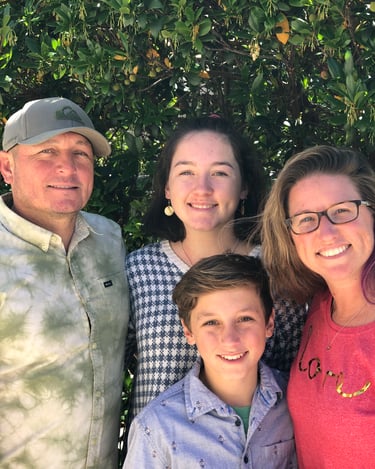When it comes to fostering infants and toddlers, Angels foster families say that flexibility is key. It is especially helpful when foster parents are also creative and clever like this month’s Foster Family of the Month, the Kronk-Estradas: Laura and Josue, and their children Petra, 14, and Gabriel, 12, who have been fostering for two years.
Their first placement was a sibling set, three-month-old “Annie” and two-year-old “Adam,” who were neglected by their biological mother. Annie had severe separation anxiety and cried throughout the night, so Laura started doing baby massage to help the infant relax. Soon Annie learned to trust that her needs would be met and began falling asleep with ease. Adam was a tougher case. He wasn’t taught to speak and communicated only through a series of grunts so Laura taught him sign language; within a week he communicated clearly. A former preschool teacher, Laura used her skills to make a game of verbal communication. Adam was speaking age-appropriately within four weeks.
 Adam faced other challenges, though. In his first two years, he was regularly deprived of food. As a result, when Laura and Josue offered Adam food, he ate too much, too fast, often to the point of vomiting. After Thanksgiving dinner, Laura discovered that Adam had stuffed food in his pockets, saving it for later. Laura and Josue explained to Adam that there would always be enough food for him and decided to take him to Vons so he could see for himself. “He was blown away at the supermarket,” explains Josue. “His eyes got huge and he was excited.” Soon Adam replaced stuffing himself with humming and singing as he ate.
Adam faced other challenges, though. In his first two years, he was regularly deprived of food. As a result, when Laura and Josue offered Adam food, he ate too much, too fast, often to the point of vomiting. After Thanksgiving dinner, Laura discovered that Adam had stuffed food in his pockets, saving it for later. Laura and Josue explained to Adam that there would always be enough food for him and decided to take him to Vons so he could see for himself. “He was blown away at the supermarket,” explains Josue. “His eyes got huge and he was excited.” Soon Adam replaced stuffing himself with humming and singing as he ate.
“It’s so neat to see the growth,” says Laura. “You soon forget the trauma and just start seeing just the children.”
As resilient as children are, though, they are always impacted by their early childhood experiences, which is why Angels Foster Family Network provides “trauma-informed care” as part of its certification process. Foster parents are always given tools and resources so they can help young children bounce back as well as Laura and Josue’s foster placements.
The siblings were reunified with their biological family after nearly a year. Laura and Josue receive regular updates and photos of the children and hope to remain part of their lives.
The family’s next placement was “Bee,” a baby girl who was taken into foster care at birth. Laura says Bee was such an easy baby, fostering didn’t require much creativity, just love and nurturing.
Normally, Angels foster families only have one child or sibling set at a time, but on rare occasion, an exception is made. The Kronk-Estradas were asked to consider taking an older toddler whose foster parents had relocated to another state. They agreed, and soon four-year-old “Rory” joined the family after having had a rough start in life.
Laura and Josue noticed that Rory was highly attuned to facial expressions and that certain words triggered a reaction. They also took note of what she loved and what she didn’t enjoy and tried to connect the two. For example, Rory loved helping take care of baby Bee but was not a fan of washing her hands. Laura says, "We told her that if she wanted to play with Bee she had to wash her hands," explaining that unwashed hands can transmit germs that might make Bee sick. That made sense to Rory, who shrugged, then hopped to the sink to suds up.
The family regularly collaborates on creative solutions for meeting the needs of foster children in their care. They help each other solve problems and troubleshoot. “It’s just teamwork,” Laura says. “The whole family works together.”



